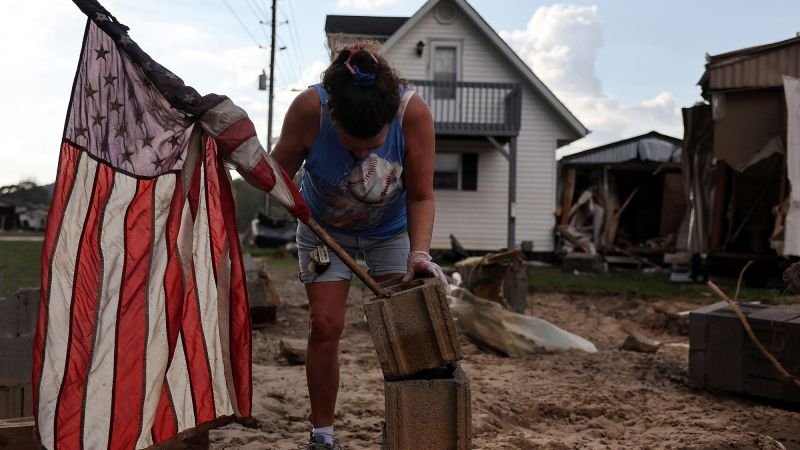Hurricane Helene made landfall as a Category 4 storm, causing widespread and devastating flooding across Florida, North Carolina, South Carolina, and Georgia. The data analytics firm CoreLogic estimates that the storm resulted in up to $47.5 billion in losses for property owners. Despite the significant impact of the hurricane, many residents in Helene’s path did not have flood insurance. CoreLogic estimates that between $20 billion and $30 billion of the losses caused by the hurricane were uninsured flood losses, far surpassing the estimate of uninsured wind and flood losses.
According to CoreLogic, a significant portion of the losses from Hurricane Helene are likely to go uninsured, leaving individual property owners responsible for paying for repairs. The total wind and flood losses caused by the hurricane across 16 states are estimated to be between $30.5 billion and $47.5 billion. The firm does not plan to issue another update on the cost figures unless new developments warrant it. As Hurricane Milton intensifies and heads towards Florida, the potential for additional damage looms, further emphasizing the lack of flood insurance in areas facing significant flooding threats.
Hurricane Helene left a trail of devastation in its path, particularly impacting western North Carolina, where entire communities were left in ruins. The death toll from Helene has risen to at least 232 people across six states, making it the second-deadliest hurricane to hit the US mainland in the past 50 years. In Florida, historic tidal levels in areas like Tampa Bay and St. Petersburg caused significant damage to hotels and condos. The impact of these storms has been exacerbated by record-warm waters in the Gulf of Mexico, with standard homeowners’ insurance policies typically not covering flooding.
To protect against flooding, homeowners often need to purchase flood insurance separately, usually through the National Flood Insurance Program managed by FEMA. While homeowners with federally backed mortgages in Special Flood Hazard Areas are required to have flood insurance, those without mortgages or outside these areas are not mandated to have it. The vast majority of the damage from Hurricane Helene was due to flooding, with wind causing only a fraction of the losses. In Florida, the small town of Perry suffered the most significant wind losses, despite its relatively small population of 7,000 people.
The lack of flood insurance in areas prone to significant flooding highlights the potential financial burden placed on individual property owners in the aftermath of hurricanes like Helene. As the cost of natural disasters continues to rise, the importance of having adequate insurance coverage to protect against such events becomes increasingly critical. Moving forward, addressing issues related to insurance coverage and disaster preparedness will be essential in mitigating the impact of future hurricanes and ensuring the timely recovery of affected communities.











